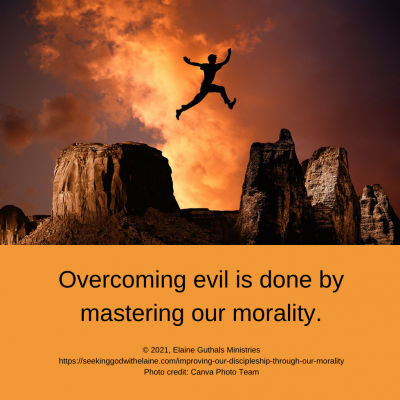In the last three devotions, we have been looking at how to improve our discipleship through our morality. This daily devotional reviews what we’ve discussed and makes the connections and applications.
To read devotions in the Redo for Godliness series, click the appropriate button below.
Devotions in the Moralities Lead to Godliness series

We are looking at how Manton began to tie up his sermon entitled The Moralities of Christianity. Our purpose in this devotion is to make the connections and applications for this section. We have covered a lot of ground in the last three devotions alone.
Resources
Let's Put It into Context
The definition of moral, according to the Merriam-Webster Dictionary, is “of or relating to principles of right and wrong in behavior.” Morality, then, is “a doctrine or system of moral conduct.” When it is the plural form — moralities — it is a “particular moral principles or rules of conduct.”
Resources
Our morals determine our character. Character, according to the Merriam-Webster Dictionary, is “the complex of mental and ethical traits marking and often individualizing a person, group, or nation.”
Resource
Making the Connections
The Moral Code Given through the Law
- God gives us definite instructions as to what is right and wrong. Our morality is contingent on the grace of God. We are moral people because grace teaches us to be holy (Improving Our Discipleship through Right and Wrong).
- The laws show us God’s character. But they aren’t the end-all, be-all. The law won’t save us as faith is more than just a rote memorization of the laws and commandments that make up the morals. We could be a good person who follows the laws perfectly and still miss heaven. We have to expand the morals to make them graces (How Do Morals Improve our Discipleship?).
- Our intent in coming to God should be so that we become in harmony with Him. The laws and commandments must change our character at the heart level to be like His. We can’t do this by ourselves (How Do Morals Improve our Discipleship?).
- God through His grace encourages us and guides us to where He wants us to be. The laws are no longer threatening but instructive. He will use our Sanctification Roads to be more like Him. As we grow our character, we need to use reflection on our previous experiences (How Do Morals Improve our Discipleship?).

- We glorify God when we have a clear moral conscience. Our consciences attest to the quality of our actions. That validates the need for us to be knowledgeable with God’s code of morals (Improving Our Discipleship through Glorifying God).
- It is a two-step process in attesting to the quality of God’s moral code. We need to affirm that God’s law is pure. We need to confess we are far from pure (Improving Our Discipleship through Glorifying God).
Morality Enforced through Our Walk
- Our morality increases from the sanctification process. Morality is a system of conduct where we determine right from wrong. Isn’t that what the Sanctification Road is teaching us through the Holy Spirit? What we are learning through grace as we navigate our roads is what makes up “… all goodness, righteousness, and truth” (Eph. 5: 9 CSB) (How Do Morals Improve our Discipleship?).
- Our outward conversations and actions are the visible aspects of our lives. God expects our relationships with Him to be visible to others. Worldview people have to be able to see what we believe. But that stems from the inside (How Do Morals Improve our Discipleship?).
- God is love (I Jn. 4: 8). When we become like God, we love. When we focus on the greatest commandments, we go a long way to getting there. Love is the root of virtue. God is love. God is the root of virtue (How Do Morals Improve our Discipleship?).
- We have to approach worldview people with love but realistically. We can’t approach them in ways that accentuates the divide, but we cannot tolerate sin (Improving Our Discipleship through Right and Wrong).
- The fruit — or rewards — of our walk as children of God are that God can work within us to build a solid relationship that leads to godliness. These morals come from one thing — obedience to God through faith in Jesus. If God isn’t at the core of our morals, the only reward we will receive for doing them is here on earth (How Do Morals Improve our Discipleship?).
- The “… all goodness, righteousness, and truth” (Eph. 5: 9 CSB) is a packaged deal. We don’t get to choose the goodness and pass on the righteousness part. If we do, we are passing on the God part. They are interwoven. Think of the foundation that builds when the three areas are braided together. The package deal has to become our character (How Do Morals Improve our Discipleship?).
- Our entire life should be focused on glorifying God through living morally. The bottom line is our motivation. Are we choosing to follow God or not? (Improving Our Discipleship through Glorifying God).

- We need to make the choices that bring glory to God. Nothing is too small or too large that it can’t be used to do that. We don’t have to keep finding the next best thing. He wants to be glorified in our everyday lives. When we glorify God through our being and our doing, we are making a big statement that He is worthy of our praise (Improving Our Discipleship through Glorifying God).
- Worldview people just see the ceremony of religion rather than the relationship for which God is actually striving. They see morality as a man-to-man exercise, not as man-to-God (Improving Our Discipleship through Glorifying God).
- We glorify God by the good works performed through His righteousness in us. Our being and doing should be to glorify God (Improving Our Discipleship through Glorifying God).
- We know these works do not justify us in God’s eyes. We use them to express our respect of, tribute to, and obedience to Him (Improving Our Discipleship through Glorifying God).
- A clear conscience can only come from fulfilling our duties as children of God — to fulfill the greatest commandments. Using them as the bow, we tie together God’s rules and our actions (Improving Our Discipleship through Glorifying God).

- Even though we have a conscience, the decision is still ours. We can follow our conscience’s direction to be a moral person or we can choose not to (Improving Our Discipleship through Glorifying God).
- Being a memory ties the conscience to our past, formed by our past experiences and past knowledge. It is shaped by the morals to which we have ascribed (Improving Our Discipleship through Glorifying God).
- Our conscience is not stagnant and can change. It can grow to be more godly (Improving Our Discipleship through Glorifying God).
- The outward walk without the inward faith means nothing to God. Morals have to be grounded in faith. If our morals don’t come through our submission to God, they are just worldly morals, not Christian graces (How Do Morals Improve our Discipleship?).
Morality Enforced through Our Faith
- Our morality is a reflection of our faith and is expressed through love (How Do Morals Improve our Discipleship?).
- It isn’t just the knowledge of God and what Jesus has done for us. It is having the faith to believe we could never be restored on our own (How Do Morals Improve our Discipleship?).
- We should come to God in order to become like Him as He is different from us. We want to be obedient and follow His laws and commandments. But it is more than what we do or don’t do. When we submit our will to Him, we truly become like Him (How Do Morals Improve our Discipleship?).
- We will be forced to make a number of choices choices for or against God every single day. We need to choose what is right and good in order to combat evil (Improving Our Discipleship through Right and Wrong).

Morality Is More Choosing Good over Evil than Right Over Wrong
In God’s Word, good is always right and evil is always wrong, so to be morally correct, we need to repay evil with good (Improving Our Discipleship through Right and Wrong).
Some worldview people see Matthew 25: 31-46 as believing disciples should work to eliminate the social injustices of the world. But let’s flip the narrative and redefine good as our spiritual condition (which is God’s priority), not our physical condition.
• For I was hungry for the Word of God, and you introduced me to it and helped me understand.
• I was thirsty, and you took me to the well of Living Water and gave me drink.
• I was a stranger searching for God, and you welcomed me and guided me to find Him.
• I was naked, and you clothed me (Isa. 61: 10).
• I was sick because sin is an illness, and you visited me with the cure.
• I was in prison (Gal. 3: 22) because all sinners are prisoners to sin, and you came to tell me how to break out (Improving Our Discipleship through Right and Wrong).- Repaying evil for evil escalates the situation, not fixes anything. Repaying good for good looks okay on the surface but also doesn’t fix anything. Repaying good with evil does not show God’s love. That can only be done when repaying evil with good (Improving Our Discipleship through Right and Wrong).
- Overcoming evil is done by mastering our morality. When we discipline our passions and make good judgments, we provide a good witness and build relationships (Improving Our Discipleship through Right and Wrong).

- Evil (a.k.a. Satan) is going to want us overwhelmed. He will want us caught up in our passions, not thinking about God or what He wants us to do. He wants us surfing the moment on a downhill wave (Improving Our Discipleship through Right and Wrong).
- We can withstand Satan’s onslaught. We have the Sovereign God in our corner. He is greater than anything we face — even Satan himself. Now we just have to convince ourselves of that. All we see Satan coming at us from all sides (Improving Our Discipleship through Right and Wrong).
- We have to balance the situation and determine what God is really calling us to do. We are not giving into evil and “losing” the battle when we forgive the offense and let it go. We do that when we give into the temptation and respond as a worldview person would (Improving Our Discipleship through Right and Wrong).
- How we react to adversaries of the gospel and approach evil is important. We don’t want to condone the evil, but we don’t want to alienate the person to whom we are witnessing. We definitely don’t want to be tempted by it. We don’t want to be antagonistic. We can’t have a holier-than-thou attitude (Improving Our Discipleship through Right and Wrong).
- Even though we may hate something that is evil, we may not necessarily have victory over it. We have to make sure that the hatred is evidenced by our not associating ourselves with it (Improving Our Discipleship through Right and Wrong).

How Do We Apply This?
- We have to believe we could never be restored to a relationship with God on our own.
- We have to know what God’s instructions say. We should use the packaged deal of “… all goodness, righteousness, and truth” (Eph. 5: 9 CSB) as a springboard to grow our faith and morals.
- We have to increase our faith so that our morals are not just worldly morals, but Christian graces.
- We need to be in harmony with God by changing our character to be like His and make the daily choices that bring glory to God and help us grow to be more godly.
- We need to focus our entire life on glorifying God through living morally with the correct motivation.
- We have to strive to have a clear moral conscience by keeping our outward conversations and actions consistent with what God wants.
- We have to approach worldview people with love but realistically.
- We perform the good works by being and doing to fulfill the greatest commandments.
- We have to master our morality by disciplining our passions and making good judgments to overcome evil.
- We need to focus on God when Satan tries to overwhelm us.
- We have to watch how we approach evil and balance the situation to determine what God is really calling us to do.
Gracious Heavenly Father. We want to be more like You. If we change our moral character, we can. We know we won’t be perfect until You call us home. Thank You for forgiving us when we fail. Amen.
What do you think?
Leave me a comment below (about this or anything else) or head over to my Facebook group for some interactive discussion.
If you don’t understand something and would like further clarification, please contact me.
If you have not signed up for the email daily or weekly providing the link to the devotions and the newsletter, do so below.
If God has used this devotion to speak with you, consider sharing it on social media.
What do you think?
Leave me a comment below (about this or anything else) or head over to my Facebook group for some interactive discussion.
If you don’t understand something and would like further clarification, please contact me.
If you have not signed up for the email daily or weekly providing the link to the devotions and the newsletter, do so below.
If God has used this devotion to speak with you, consider sharing it on social media.
Hello. remarkable job. I did not anticipate this. This is a excellent story. Thanks! Gusti Nicky Trudnak